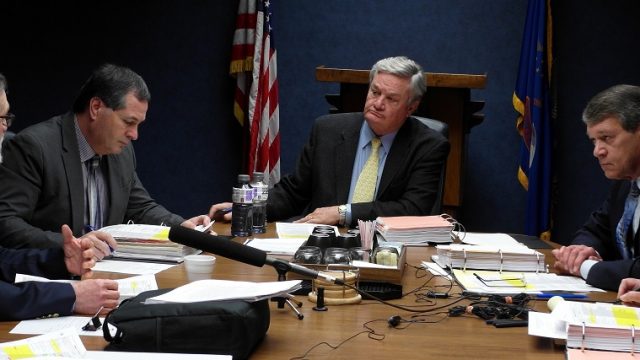Industrial Commission’s “Interested Party” Rule Was Never About Muzzling the Public

Lynn Helms, from left, director of the Department of Mineral Resources, presents to Industrial Commission members Doug Goehring, Gov. Jack Dalrymple and Wayne Stenehjem on Tuesday, Feb. 16, 2016, in Bismarck. Amy Dalrymple/Forum News Service
At a meeting of the North Dakota Industrial Commission this week the triumvirate – Agriculture Commissioner Doug Goehring, Attorney General Wayne Stenehjem, and Governor Jack Dalrymple – shot down a proposed rule which would have limited public participation in hearings before the commission to members of the public with a defined interest in the subject matter.
Today the Fargo Forum editorial board takes a victory lap. “North Dakota oil and gas regulators, who often are perceived as being in the hip pocket of the industry, will respond in the right way when the public speaks up,” the paper writes. “That’s what happened this week when the Industrial Commission scrapped a proposed definition in new oil and gas rules that would have prevented most North Dakotans from testifying on energy-related matters that come before the commission.”
That’s not really an accurate description of the proposed rule and how it would have been applied.
I am very much in favor of public participation in government. In fact, earlier this week I was critical of local governing entities which have been banning citizens from participation, and suggested a law requiring some level of regular public comment at the state’s public meeting. I can say that I’ve already been contacted by lawmakers who say they’re interested in introducing such a bill.
The Forum suggests that the “interested party” rule “was an attempt by the industry to close the commission door to environmental advocates, landowner rights groups and other individuals and organizations that have concerns about the pace and impacts of energy development in oil country.”
But the proper venue for that sort of public comment, for that sort of advocacy, is during times set aside for general public comment about the regulation of oil and gas development. Not during hearings about specific development happening on specific parcels of land involving specific landowners, energy companies, etc.
Participation in those hearings should be limited to the parties who are directly involved.
The NDIC should have passed the “interested party” rule (perhaps with some tweaks to expand the definition of “interested party” a bit which was, admittedly, a bit too narrow) and coupled the rule with the creation of a policy of routine time in their meeting agendas for generalized public comment.
That way those folks who wish to comment generally on the NDIC’s handling of oil and gas development could have the opportunity to do so, but they wouldn’t have the ability to filibuster specific development.
We’ve all seen how the environmental activists operate. They will use lawsuits and protests and, in extreme and thankfully isolated cases in other parts of the country, even outright sabotage to inhibit fossil fuel energy development. There is nothing wrong with protecting North Dakota’s regulatory process from unreasonable delays as long as there is still a reasonable level of public input still allowed.




